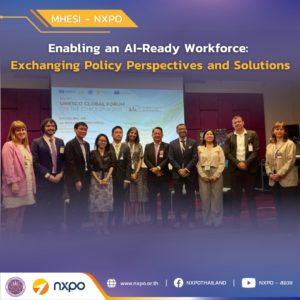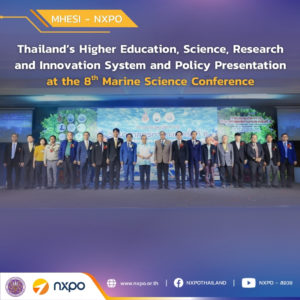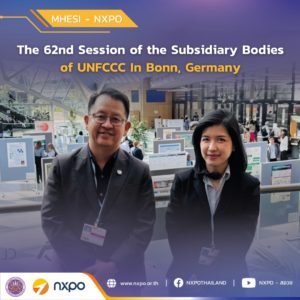NXPO President Dr. Kitipong Promwong was invited to give a talk in a forum organized by Suratthani Rajabhat University on the topic higher education, science, research and Innovation policy and its implication to university.

Dr. Kitipong first provided the sustainable goals set in the current higher education, science, research and Innovation policy. For the social and environmental objectives, eco-efficiency will be improved through resource-use reduction. In term of grassroots economy, the number of people living below the poverty line will be reduced from 6.7 million to 1 million. The goal for innovation-drive economy is to create 1,000 innovation-driven enterprise (IDEs) with 1 billion THB sales. These ambitious goals require the reinvention of higher education and the system reform of high education and its role in research and innovation.
Changes in education and human resource development will be driven by new trends such as multi-stage life and digital transformation. Multi-stage life requires continuous learning to enable workers to weather changes and disruptions in job market landscape. Workers need to be upskilled and reskilled to meet the ever-changing job requirements. Universities therefore need to offer lifelong learning programs to accommodate this need. Digital technology is an enabling tool to foster learner/student experience to meet their needs. Faculty members may need to adjust their role from teaching to coaching and mentoring. Dr. Kitipong gave an example of Western Governors University (WGU). Despite being an online university, WGU is able to deliver quality education as proven by the growing student enrollment, 73% of which are full-time workers and 23% are low-income people. The employment rate of WGU graduates is as high as those of other leading universities.
Higher education sandbox is being established to pave the way for new education systems and innovations such as a program that engages industry in the design and delivery to ensure that student quality meeting the industry demand, new multidisciplinary, interdisciplinary and transdisciplinary programs or a customized curriculum. This sandbox will allow universities to experiment with new forms of education that will eventually deliver workforce for the future development.
Dr. Kitipong suggested that universities could play a key role in post-COVID recovery by strengthening a local economy by providing knowledge and technological support and capacity building to entrepreneurs, farmers, service providers to offer better products and services and improve efficiency. For instance, capacity of the manufacturing sector can be enhanced with robotics and automation, whereas farmers can adopt smart farming to increase quality and productivity of their farm commodities. New business opportunity for high-value products such as alternative protein can be introduced to entrepreneurs. Universities can serve as a sizable market for local products and services, as well as help establish market platforms, both on-ground and online marketplaces, for local products.
Among new initiatives in the planning that will be beneficial to universities include an establishment of higher education fund to strengthen universities, the revision of regulations in hiring consultants to facilitate an innovation ecosystem, and the Thai Bayh-Dole Act that will allow universities to own the patent of an invention created by government funding thus enabling universities to commercialize the invention.







